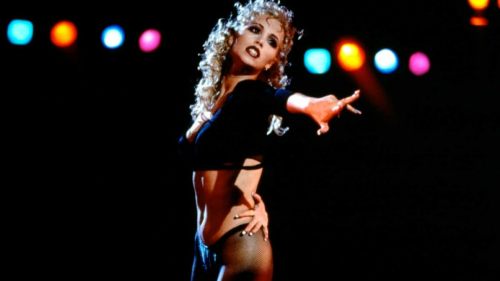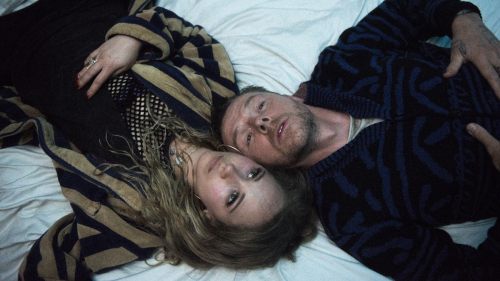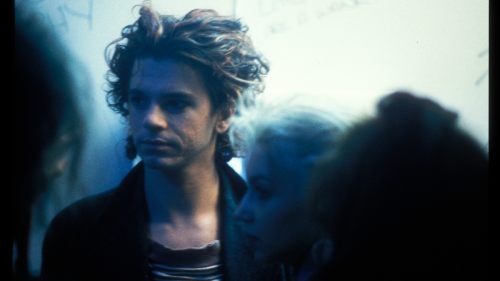Tribeca ’19 Review: YOU DON’T NOMI Bares Many Views On SHOWGIRLS
The old saying “One man’s trash is another man’s treasure” has come to define a wave of revisionist thinking about movies from the 1980s and, more recently, the 1990s. Look up any film from those decades that was reviled by critics, filmgoers or both at the time, and you’re likely to find someone online making a case for it as an unappreciated masterpiece, or at least worthy of serious re-evaluation. Arguably the most reviled ’90s release was Showgirls, director Paul Verhoeven and screenwriter Joe Eszterhas’ paean to the sleazy world of Las Vegas, which has become a camp classic in the years since. You Don’t Nomi, Jeffrey McHale’s documentary that world-premiered at the Tribeca Film Festival, asks whether it should be looked at as something more.
Showgirls was already notorious before it opened in September 1995. It was Verhoeven and Eszterhas’ follow-up to their controversial but extremely successful Basic Instinct, and promised to take that film’s sexual exploits several steps further. It was the first movie to get a nationwide studio release with an NC-17 rating—most likely not out of a sense of adventurousness, but because MGM/United Artists looked at what they had and figured they had nothing to lose. Reviews were vicious, and Showgirls was a major box-office flop. But does the film have value that people didn’t see back then? Is it actually a crafty satire on the excesses it dramatizes?
That’s a fair question, especially since a lot of people didn’t get the joke in Verhoeven’s Starship Troopers when it first came out either. For You Don’t Nomi, McHale assembled a cross-section of commentators, ranging from author Adam Nayman—who devoted an entire book, It Doesn’t Suck: Showgirls, to reconsidering the movie—to drag performer Peaches Christ, who has hosted massively popular revival screenings, to film critics Haley Mlotek, Barbara Shulgasser-Parker and Susan Wloszczyna. They all bring distinctive points of view on the subject; to its credit, You Don’t Nomi isn’t simply a feature-length defense of Showgirls, but a demonstration that a work of pop culture once unanimously condemned can in fact inspire a wide range of responses and analysis.
As such, it won’t necessarily change anyone’s mind about the movie, and your mileage may vary when it comes to whether the various arguments hold water. Nayman, who makes the most impassioned case that Showgirls has been unfairly maligned, unfortunately sinks to the reactionary cheap shot of claiming that it was really Oscar-winners like Forrest Gump and American Beauty that were the worst films of their era. Meanwhile, the female critics express varying levels of appreciation and concern over Showgirls’ treatment of women, with some appropriate condemnation of the rape scene that even Eszterhas retroactively acknowledged was a mistake. (Not addressed is what I’ve always thought of as a particularly troubling element: The assaulter was evidently conceived as a Harry Connick Jr.-esque crooner, but was cast with a hirsute actor bearing a remarkable resemblance to Eszterhas himself.)
Comparing points of view with the commentators is the best way to appreciate You Don’t Nomi, since McHale doesn’t really let us get to know them. They never appear on camera, and their voices are only sporadically identified, making it difficult sometimes to discern who is speaking, and also to determine the through-line of their thoughts on Showgirls. On the other hand, McHale demonstrates some wit of his own as a filmmaker, cleverly incorporating Showgirls clips into scenes from other Verhoeven movies, and making amusing use of one of star Elizabeth Berkley’s most infamously histrionic moments from Saved by the Bell. Speaking of which, the contributor who winds up making the strongest impression is actress April Kidwell, a sexual-assault victim who found therapeutic catharsis re-enacting Berkley’s roles in the stage productions Bayside! The Musical! and Showgirls! The Musical!
Toward the end of You Don’t Nomi, we watch as Berkley attends a 2015 Hollywood revival screening of Showgirls packed with cheering, appreciative fans. Like similar events documented in the Troll 2 chronicle Best Worst Movie and dramatized in The Disaster Artist, it brings up the question: Can a movie really be bad if so many people now get enjoyment out of it? The question is asked in the other direction by the clips from Showgirls itself, showcasing its misogyny-soaked attitude and mind-bogglingly awful dialogue. As you’ve probably gleaned by now, I’m not in the camp that considers Showgirls to be any kind of unacknowledged gem. So it’s a compliment to say that You Don’t Nomi had me engaging with, if not completely buying, the opinions of those who find more worth in it.



